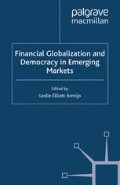Abstract
Recent decades have seen momentous shifts in the forms and quantity of capital transfers from advanced industrial countries, net creditors as a group, to developing countries, net debtors as a group. The 1950s and 1960s were the era of foreign aid, with foreign direct investment also an important source of funds, and the 1970s the heyday of commercial bank lending. The 1980s saw a return of foreign assistance, this time mostly from multilateral rather than bilateral lenders and often associated with painful structural adjustments to the third world debt crisis, which hit hardest in Latin America and Sub-Saharan Africa. The 1990s has seen the rise of the ‘new’ portfolio flows, as first world mutual fund managers snap up the stocks and bonds of each week’s hot new investment destination, from Mexico to the Philippines to such seemingly unlikely destinations as Bulgaria, Kazakhstan, and Algeria. The 1980s and 1990s have also been a period of widespread democratization in developing and transitional economies, from Latin America, to East Asia, to Eastern Europe and Africa.
I join Tom Biersteker in expressing my gratitude to the two keynote speakers at the November 1995 conference that initiated this volume, Jesús Silva Herzog and Júlio de Quesada, and those institutions and persons that made the project possible. I particularly thank the International Studies Association, the Watson Institute for International Studies, Craig Murphy, Chris Bosso, Jean Lawlor, Fred Fullerton — and especially Thomas J. Biersteker. In addition to those authors whose work appears in this collection, I also thank those others who presented or discussed papers at the 1995 meeting, including Lawrence Broz, Vikram Chand, Benjamin J. Cohen, Zhiyuan Cui, Nomsa and Francis Daniels, Denise Dresser, E.V.K. FitzGerald, Peter Garber, Laura Hastings, Joshua Hoffman, Saori Katada, Arvid Lukauskas, Luís R. Luís, Sylvia Maxfield, Gesner Oliveira, Ravi Ramamurti, U. Srinavasa Rangan, Moises Schwartz, Thomas Skidmore, Robert Wade, and Ngaire Woods. Special thanks are due to Timothy M. Shaw, general editor of the International Political Economy series, and to Aruna Vasudevan and Keith Povey for the publishers.
Access this chapter
Tax calculation will be finalised at checkout
Purchases are for personal use only
Preview
Unable to display preview. Download preview PDF.
Note
Ethan B. Kapstein, Governing the Global Economy: International Finance and the State (Cambridge, Mass.: Harvard University Press, 1994), pp. 82–83.
Editor information
Editors and Affiliations
Copyright information
© 2001 Leslie Elliott Armijo
About this chapter
Cite this chapter
Armijo, L.E. (2001). Introduction and Overview. In: Armijo, L.E. (eds) Financial Globalization and Democracy in Emerging Markets. International Political Economy Series. Palgrave Macmillan, London. https://doi.org/10.1057/9780333994894_1
Download citation
DOI: https://doi.org/10.1057/9780333994894_1
Publisher Name: Palgrave Macmillan, London
Print ISBN: 978-0-333-93067-0
Online ISBN: 978-0-333-99489-4
eBook Packages: Palgrave Economics & Finance CollectionEconomics and Finance (R0)

